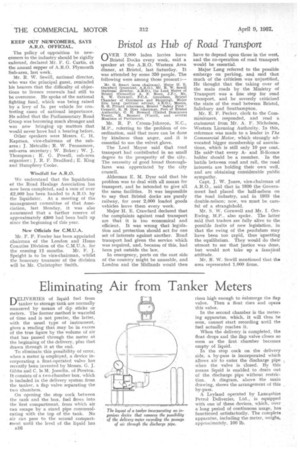Bristol as Hub of Road Transport O VER 2,000 laden lorries
Page 50

If you've noticed an error in this article please click here to report it so we can fix it.
leave Bristol Docks every week, said a speaker at the A.R.O. Western Area dinner, at Bristol, last Saturday. It was attended by some 350 people. The following were among those present:— Mr. G. Smart (area chairman), Major If. E. Crawford (president, A.R.0.), Mr. R. W. Sewill (national director, A.R.O.), the Lord Mayor of Bristol (Councillor A. F. Moon, J.P.), Mr. S. W. Cornwell, F.C.A. (president, Bristol Chamber of Commerce and Shipping), Maier Eric Long (political adviser, A.R.O.), Messrs. R,. G. Pittard (chairman, Bristol " Safety First" Council), E. M. Dyer (chairman, Port of Bristol Authority). C. R. Howard (United Dominions Trust). R. Bennett (Viscol), and several Members of Parliament.
Mr. R. P. Crown-Johnson, K-G., M.P., referring to the problem of coordination, said that more can be done by kindness than anger, and it is essential to use the velvet glove.
The Lord Mayor said that road transport had contributed in no small degree to the prosperity of the city. The necessity of good broad thoroughfares was appreciated by the city council.
Alderman E. M. Dyer said that his problem was to deal with all means for transport, and he intended to give all the same facilities. It was impossible to say that Bristol docks are purely railway, for over 2,000 loaded goods vehicles leave them every week.
Major H. E. Crawfurd declared that the complaints against road transport are that it is too economical and efficient. It was wrong that legislation and protection should act for one set of interests against another. Road transport had given the service which was required, and, because of this, had been put outside the law.
In emergency, ports on the east side of the country might be unusable, and London and the Midlands would then
have to depend upon those in the west, and the co-operation of road transport would be essential.
Major Long referred to the possible embargo on parking, and said that much of the criticism was unjustified. He thought that the taking over of the main roads by the Ministry of Transport was a fine step for road transport, and he severely criticized the state of the road between Bristol, Salisbury and Southampton.
Mr. E. F. Pecker, clerk to the Commissioners, responded, and read a statement from Mr. A. F. Nicholson, Western Licensing Authority. In this, reference was made to a leader in The Commercial Motor, which strongly advocated bigger membership of associations, which is still only 10 per cent. He said* that every Aand B-licence holder should be a member. In the battle between road and rail, the road interests are holding their own well, and are obtaining considerable public sympathy.
Capt. J. W. Jones, vice-chairman of A.R.O., said that in 1930 the Government had placed the half-nelson on the toad industry, and in 1933 the double-nelson; now, we must be careful of a stranglehold.
Mr. S. W. Cornwell and Mr. I. OrrEwing, M.P., also spoke. The latter said that traders are hilly alive to the possible faults of new legislation, in that the swing of the pendulum may have been too rapid, thus upsetting the equilibrium. They would do their utmost to see that justice was done, but would not take up a fanatical attitude.
Mr. R. W. Sewill mentioned that the area represented 1.000 firms,




















































































